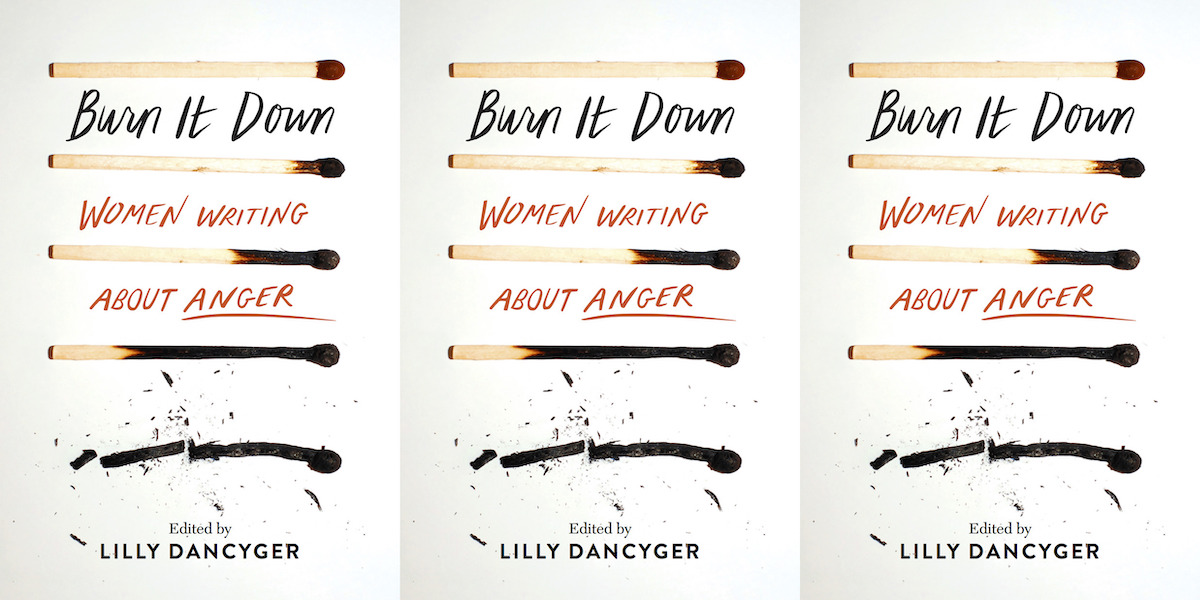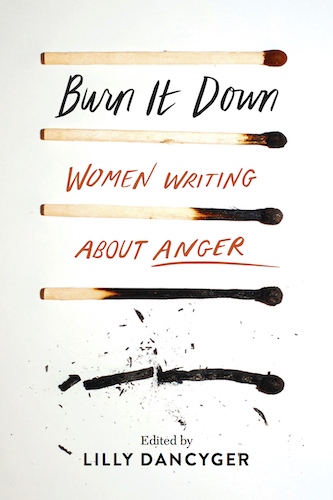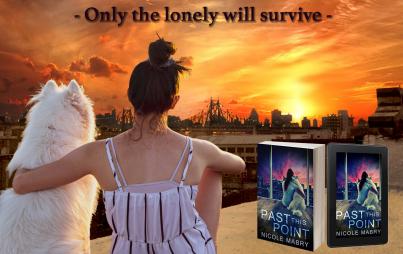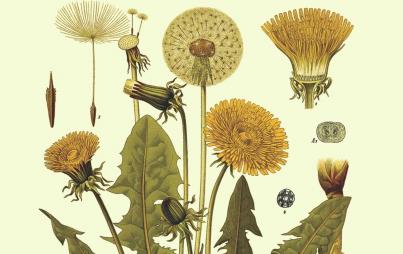
Burn It Down: Women Writing about Anger
I sat down with Lilly Dancyger to talk about her anthology, Burn It Down: Women Writing about Anger.
OprahMag.com says, "Comprising essays from an amazing cast of contributors...this cathartic and incendiary anthology rages against the notion that women should temper their fury."
And from Kirkus Reviews: "Powerful and provocative, this collection is an instructive read for anyone seeking to understand the many faces--and pains--of womanhood in 21st-century America."
I am honored to have an essay in the collection, to be a tiny part of a very necessary book. Recently, Lilly and I met up in a cozy hotel lobby in Greenwich Village for a heart to heart about the book and anger and the ways we've experienced it.

Erin Khar: This is probably a question you get all the time, and I know a little bit about this... When Seal Press first approached you about editing an anthology about women and anger, what did you envision for the book?
Lilly Dancyger: At first, I was just really excited about the opportunity to reach out to writers I’d admired and hear them talking about anger. More than a specific shape that I wanted it to be, I thought about the different voices I wanted to have in it and the possible directions it could go. I knew I wouldn’t be able to cover everything, but I tried to cover as much as possible — in terms of as many different experiences, backgrounds, identities, expressions of anger, and styles of essays.
Khar: Do you think that, as a woman, your relationship with anger has changed since the 2016 election and/or since the #MeToo movement?
Dancyger: I think so, yeah. The period between the 2016 election and now is not the first period of my life where I’ve woken up and gone to sleep angry every single day. But its definitely a new version that. I’ve had boiling, intense, personal anger at various stages of my life. But in this era we’re in now, I realize it’s this collective anger.
Khar: I know what you mean because that’s what I’ve been thinking, too. As women, many of us were isolated in our anger; now, there’s almost a sisterhood in being angry together. My anger feels more validated now than it did four years ago.
Dancyger: Right. It used to be that I was just an angry person and that was something I thought was particular to me and something that I had to deal with and had to work out and learn to live with. And now, it’s like — yeah, of course, I’m angry, aren’t you? I think that’s an essential part of this project. We are all realizing that, but it’s one thing to know it and another thing to deprogram and get comfortable with the idea that anger is a healthy and natural reaction to the world right now. And it’s okay to be angry; it can be useful to be angry, and it can feel good and be healing and restorative. We were taught to think that it’s only destructive. I think that’s because it’s destructive to systems that don’t benefit us.
Khar: Absolutely… I was thinking about why this book is so important. It’s that we have lacked the validation of our right to be angry. As many essayists, and you point out in your introduction as well, expressing anger is likened to be crazy, to being hysterical, to being “bad.” For this chorus of other voices to say, “No, what you’re feeling is valid,” is a huge, huge deal.
Dancyger: And so healing. That was one thing that I got while working on this book. I was in the middle of doing edits on these essays during the Kavanaugh hearings.
Khar: Ugh, I know. I was doing revisions on my essay during the hearings.
Dancyger: Yeah, and I was so angry and so upset. I know so many people were. It still kind of caught me off-guard that I could be so personally, emotionally impacted.
Khar: Because it was such a collective f*cking experience. And listening to people minimize it…
Dancyger: Yes. After watching the hearing and crying in my living room, and then going back to my office and reading these essays, I felt all this anger washing over me, and it was…yes; there is power here. Anger is not just something that happens to you. It’s something you have, and you can be fortified by it.

Khar: I think of that adage — the only way out is through. I believe that you have to feel the anger to metabolize it and expel it from your body. Otherwise, it will stay locked in and distorted in some part of your body…
Dancyger: That’s something that came up a lot. Everybody in the book who wrote about not letting themselves feel anger also wrote about the other ways it found to come out… in autoimmune disease or suicidal ideation or addiction. It goes somewhere.
Khar: Right. It has to go somewhere. What’s so cathartic for me as a writer writing an essay for this book — and I think it will be for readers as well — there is a transformation of that energy through acknowledgment, in both a varied and specific way. It’s what sets this book apart too, for me reading the other essays — it’s a book of lived experience. And I think that always appeals to me. It reflects the human experience, which comes through in these first-person narratives.
Dancyger: Exactly. Once the pieces started to come in, and I started to get a clearer idea of what the shape of this book was going to be, that’s when I formed an intention for it and thought about it in context of the other books on women’s anger that have come out recently. I thought, Okay, if I am going to add a book to this conversation, what am I adding that isn’t already represented there? How can I deepen or shift the conversation? That’s precisely where the power in these stories is. It’s not a book about anger; it’s a book of anger. I wanted it to create that heat and have it be more than processing anger on an intellectual level.
Khar: So many of these essays touch on the experience of anger from a young age and as you grow up. I think it's so important to get this book into the hands of young women.
Dancyger: Yes. I could have really used something like this when I was an angry teenager.
Khar: It’s a book that I want every young woman I know to read. I think it’s incredible to bring a book into the world that you had needed when you were younger. If you could go back to you at 11,12,13, and you wanted to give yourself some sort of advice on anger, what do you think you would say to yourself?
Dancyger: That’s an excellent question. My father died when I was 12. Pretty much from then on, I was a bat out of hell. I felt like I was raging against the world. I would tell my younger self that my anger came from an internal place, not an external place. It came from hurt. It was a response to something that needed to be dealt with. Anger is a normal part of grief, but I didn’t connect the dots.
Khar: When I was reading these 22 essays, an interesting thing happened to me. I felt like I was bearing witness, and simultaneously I felt like I was being validated and seen as well. I think that will be a common experience for other women reading this book, which is so cool. I’m so happy I got to be a part of it.
Dancyger: So am I!
Khar: Another question I have — although the audience for this book will primarily be women, because men have a hard time accepting women’s anger, for a variety of reasons — if a man were to pick up this book, what do you hope he would walk away understanding?
Dancyger: I hope men read this book. I really do. The world would benefit from more men understanding a little bit of how much shit you have to eat walking through this world as a woman. I don’t expect even the most enlightened men to ever really ever fully get what it’s like to be a woman, but they can come a little closer to empathizing.
Khar: Which may be easier for men to do reading about it than having a conversation.
Dancyger: Right! You know, initially, the book was going to be women and nonbinary people. That was the plan, but then I learned how lumping nonbinary people in with women is harmful and dismissive. Another reason I changed it is that as I started writing the introduction, I realized that everything I had to say was very specifically about women’s anger, about that very particular experience of being a woman in the world where you’re not supposed to be angry. You’re supposed to accept that you’re going to be objectified and dismissed and ignored and harassed and assaulted and so on. So it really evolved into being very specifically about women’s anger.
Khar: Right, and I think we want to be inclusive without tokenizing people of more marginalized genders.
Dancyger: Exactly.
Khar: Yes! Lastly, something I always ask people is what are you reading now?
Dancyger: I just finished Sadie Doyle’s Dead Blondes and Bad Mothers which was brilliant, and I think everyone should read it. I had to stop underlining because I was underlining everything! I also finally read Educated, and I couldn’t put it down. I was so riveted by it. One of my favorite things about it is that a lot of the tension that she builds in the story was around waiting for her to get angry. And then when she finally does…
Khar: It’s a good payoff…
Dancyger: Yeah, I think it’s a great example of how women are expected to conform and demure and accept abuse. She writes so eloquently about how she was expected to trade her reality for her father’s. And then when she finally gets angry, it’s so vindicating and cathartic.
Lilly Dancyger is a contributing editor, writing instructor, and columnist at Catapult, and an assistant editor at Barrelhouse Books. Her essays and journalism on sex, politics, and culture have appeared in Rolling Stone, The Rumpus, the Washington Post, Psychology Today, and more. She's the editor of Burn It Down, an anthology of essays on women's anger, forthcoming from Seal Press. Lilly is also at work on a memoir about her father's art and heroin addiction, and the legacy of both in her life. Follow her on Twitter at @lillydancyger.
Erin Khar is the author of the forthcoming memoir Strung Out: One Last Hit and Other Lies that Nearly Killed Me (February 25, 2020). She is known for her writing on addiction, recovery, mental health, relationships, parenting, infertility, and self-care. Her weekly advice column, Ask Erin, is published on Ravishly. Her personal essays have appeared in SELF, Marie Claire, Esquire, Cosmopolitan, Good Housekeeping, Redbook, and others. She's the recipient of the Eric Hoffer Editor's Choice Prize and lives in New York City with her husband and two kids. Follow her on Twitter @erinkhar.







